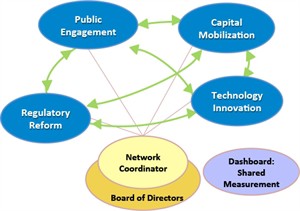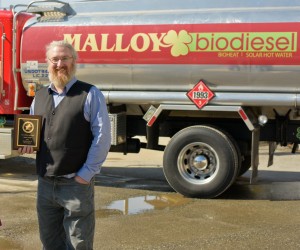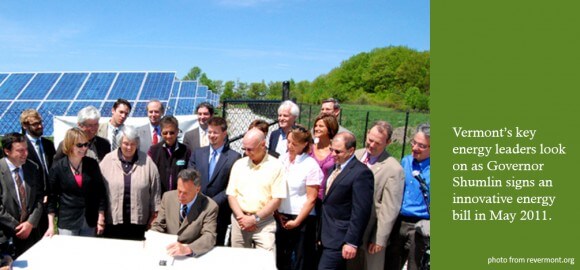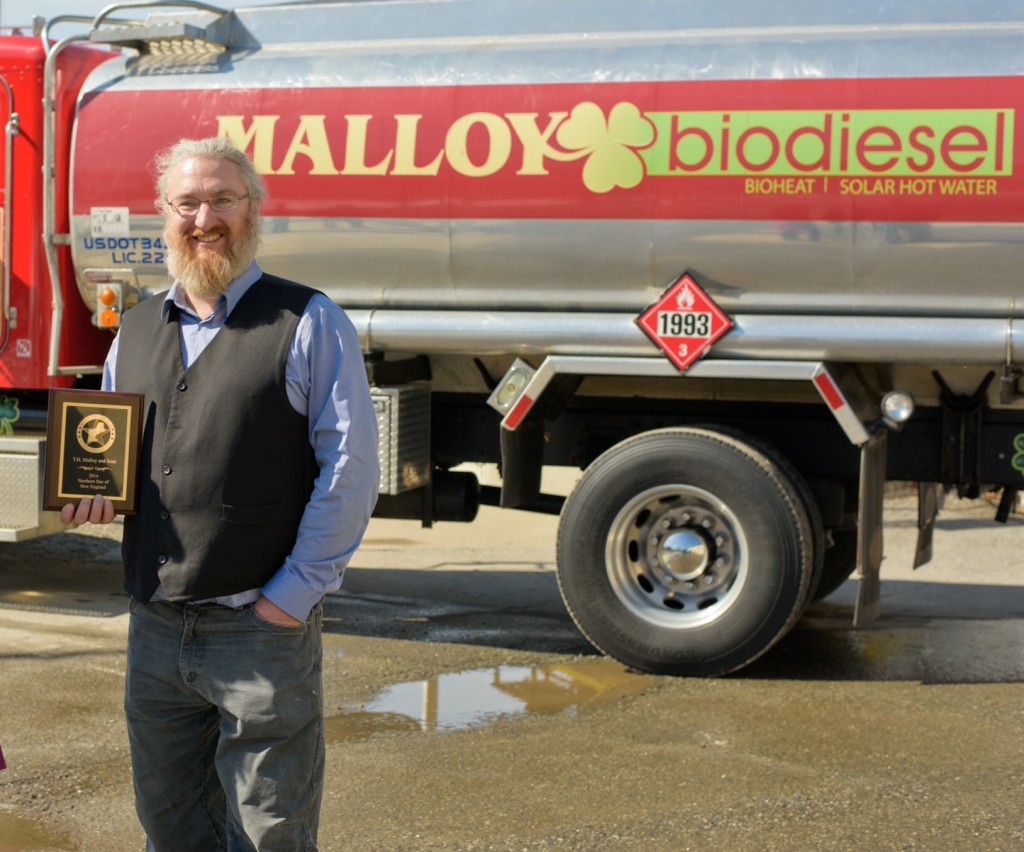
The EAN’s 4 Key Leverage Points of capital mobilization, public engagement, technology innovation, and regulatory reform
The Energy Action Network (EAN) is a community of a community of Green Mountain State stakeholders working to change the Vermont energy landscape “to end Vermont’s reliance on fossil fuels and to create clean, affordable energy and secure electric, heating, and transportation systems for the 21st century.” Their goals are consistent with the State of Vermont 2011 Comprehensive Energy Plan, which aims to meet 90% of Vermont’s energy needs through efficiency and renewable sources by 2050.
EAN has identified a series of pathways for Vermont for Vermont to accomplish the paradigm shift of 90% renewables by 2050. Membership is structured into working groups focused on four “leverage points” capital mobilization, public engagement, technology innovation, and regulatory reform. Current projects include alterations to Act 250, changes in zoning laws, programs to promote bringing rental properties into efficiency standards, and assessing current land use for its potential for bioenergy and solar projects.
One notable awareness vehicle, Brighter Vermont, encourages Vermonters to change the way common energy use and think more about where energy comes from. Read more about how Brighter Vermont helps change energy behavior. EAN also works with municipalities and recently helped Montpelier plan for a 15 year track to become the first state capital to accomplish all of its energy needs with renewable energy. On February 12, 2015 the Montpelier City council accepted and endorsed the plan to make Montpelier a “net zero” city.
Currently, EAN is working with the Vermont Sustainable Jobs Fund to expand the Vermont Energy Atlas website into the Community Energy Dashboard. The Dashboard will enable communities to understand their energy use and make clean energy choices and investments across all energy sectors—heating, transportation, and electricity. The Dashboard will make energy use visible and understandable to consumers and communities by showing town-level progress toward Vermont’s 90% renewables by 2050 goal. The Dashboard will also shows existing and potential renewable energy sites (solar, wind, hydro, biomass). We will provide updates as they develop. Stay tuned into the Vermont Bioenergy Field Notes blog and visit the Energy Action Network website to learn more.

Jim Malloy, of Plainfield, Vermont, is recognized for displacing petroleum with biodiesel in New England’s transportation sector.
Jim Malloy, of Plainfield, Vermont, is being recognized for his contributions to reducing the use of petroleum fuel in the transportation sector. His business, TH Malloy and Sons in Newport, Rhode Island, is being recognized with the New England Northern Star Award as one of the top fleets for reducing their emissions through the use of biodiesel made from recycled restaurant oil.
The 75-year-old family business is a distributor for Newport Biodiesel, also of RI, who produces biodiesel from recycled restaurant oil. Both companies are being recognized with the award.
Each recipient of the award demonstrated a deep commitment to the goals of the Clean Cities program through use of alternative fuels, alternative fuel vehicle purchasing, and petroleum reduction practices. The designation as a Northern Star required that the fleets be a stakeholder in their local Clean Cities Coalitions and that they meet a list of criteria showing their commitment to Clean Cities’ initiatives.
Malloy introduced biodiesel fuel into his RI company’s distribution fleet and has helped 4,000 customers replace oil with biodiesel. His efforts have displaced nearly 4 million gallons of oil in the past seven years. Malloy is also being recognized for the impact he has had on reducing emissions statewide by working in the RI legislature to make biodiesel a more affordable fuel option.
Replacing petroleum fuel with biodiesel that is produced locally from recycled cooking oil has the benefits of increased energy security, stronger local economies, improved air quality, and reduced contributions to global climate change.
“I am honored to be recognized,” says Malloy. “I’m passionate about recycling waste and creating an outlet for less expensive and cleaner-burning domestically-made fuel that displaces petroleum.”
Malloy is also owner of Black Bear Biodiesel in Plainfield, Vermont, which is a two-year-old restaurant oil collection recycling service and biodiesel distributor serving northern and central Vermont. The company plans to have drive-up fill-up stations at their Plainfield location in late May.
“I look forward to bringing this same passion for recycling and emissions reduction and petroleum displacement to Vermont as well, while at the same time saving locals money by providing a more efficient, cleaner fuel and an affordable replacement for petroleum,” says Malloy.
The other four recipients of the award are the City of Boston Massachusetts, the City of Nashua New Hampshire, Oakhurst Dairy in Maine and New Hampshire, and the University of Vermont.
The Northern Stars of New England program
was funded through a U.S. Department of Energy grant that identified barriers to the proliferation of alternative fuels and how to remove them. There are nearly one hundred Clean Cities Coalitions around the country whose purpose is to help reduce the use of petroleum, cut emissions, and promote alternative fuel options. The Northern Stars program was developed by the five Northern New England Clean Cities Coalitions and is just one of the ways that these coalitions promote the use of alternative fuels in fleets.
This project is funded by a U.S. Department of Energy grant awarded to Maine Clean Communities, a program of the Greater Portland Council of Governments (GPCOG), and other Northern New England Clean Cities Coalition grant partners.
More information on the Northern Stars program can be found on the Vermont Clean Cities Coalition website at www.uvm.edu/vtccc.
2014 was a busy year for the Vermont Bioenergy Initiative as we engaged in national outreach efforts to share our work connecting diversified agriculture and local renewable energy production for on-farm and community use in ways that be applicable to rural areas around the country. These rural areas are often at “the end of the pipeline” and are subject to higher and more volatile costs for energy. The Vermont Bioenergy Initiative “local production for local use” model shows that rural communities can produce some of their own energy, thereby improving their energy security and benefitting from more predictable and affordable energy prices. Any farm in any part of the country can grow and process their own fuel, using the best practices developed by the collaborating farms and UVM Extension researchers working in partnership with the Vermont Bioenergy Initiative. Funding for our program work to support research, technical assistance, and infrastructure development in emerging areas of bioenergy was secured by US Senator Patrick Leahy and the US Department of Energy.
Recent news we distributed to local, regional, and national audiences includes:
Local production for local use is biofuel model that works in Vermont.
Vermont sunflowers to help provide biodiesel power.
We have worked with several regional and national publications to secure editorial specifically featuring oil crops for on-farm biodiesel and feed, and grass energy for heating.
Check out the recent interview with our UVM Extension consultant and agricultural engineer, Chris Callahan in Biofuels Journal.
Read about alternative energy innovations on the farm featuring farms a part of the Farm Fresh Fuel Project in Farming Magazine.
The Grass Energy Report we released summer 2014 was featured extensively in both Renewable Energy World and On Pasture Magazine.
Visit the Green Energy Times website for our ongoing column, Emerging Frontiers in Bioenergy and follow the Vermont Bionenergy on Twitter for current news, trends, and tweets on renewable energy in Vermont and beyond.

Aegis Renewable Energy a Vermont based renewable energy company designed and installed the first commercial wind turbine in New York City at “Sunset Park” SIMS Municipal Recycling plant in Brooklyn. Aegis erected the 100kW wind turbine in December, 2014 and partnered with Vermont based wind turbine manufacturer, Northern Power Systems located in Barre, Vermont.
The project was recently featured in the New York Times: “In less than a month of operation, the first large-scale wind turbine to be installed in New York City, standing more than 160 feet tall, has produced enough energy to power two homes for over a year, or one 20-watt light bulb for over a century.”
The energy produced from the wind turbine “is expected to provide 4 percent of the energy used by the plant,” the Times article continues. Aegis’ CEO, Nils Behn, was also quoted in the article: “The Sunset Park waterfront’s wide-open nature makes it a prime spot for harvesting wind.”
Aegis won the project through a competitive bid process in 2011 and immediately began the electrical and foundation design process as well as completing various studies including sound and wildlife impact analyses, all of which were critical components in securing grants and permitting for the project.
Aegis has partnered with Northern Power Systems on 15 projects to date, “Northern’s undisputed position as the world leader in the 100kW wind turbine market, and their uncompromising commitment to quality, has been a key component to our success and theirs” said Nils Behn, CEO of Aegis.
During the ribbon cutting ceremony in New York, Northern Power CEO Troy Patton said “Northern Power leverages knowledge from over 400 wind turbine projects around the world to provide installers with training on the best practices for smooth and efficient installations”.
Aegis partners with other Vermont companies, including Green Mountain Credit Union which partnered with Aegis to create a community solar loan program, and the Vermont Sustainable Jobs Fund (VSJF)- Flexible Capital Fund which provided growth stage royalty financing to help Aegis expand its business operation and create more jobs in Vermont’s renewable energy sector.
About Aegis Renewable Energy
Aegis Renewable Energy offers full-service community-scale renewable energy solutions for farms, businesses, non-profits, and municipalities. Wind, Solar and Anaerobic digesters (cow manure and food waste) are included in Aegis’ services designed to help clients save money and the planet. Aegis Renewable Energy is located in Waitsfield, Vermont and provides cost evaluation, permitting, and financing support, installation, and maintenance services throughout Vermont and New England. To learn more about Aegis Renewable Energy, please visit www.aegis-re.com.
About Northern Power Systems
Northern Power Systems designs, manufactures, and sells wind turbines and power technology products, and provides engineering development services and technology licenses for energy applications, into the global marketplace from its US headquarters and European offices. Northern Power Systems has almost 40 years’ experience in technologies and products generating renewable energy. Northern Power Systems currently manufactures the NPS™ 60 and NPS™ 100 turbines. With over 6 million run time hours across its global fleet, Northern Power wind turbines provide customers with clean, cost effective, reliable renewable energy. To learn more about Northern Power Systems, please visit www.northernpower.com.
If you would like more information about this topic, please contact: Sonia Behn 802-496- 5155 or email at sbehn@aegis-re.com.
02 Feb 2015
Advanced Bioeconomy Leadership Conference 2015
The Advanced Bioeconomy Leadership Conference, to be held on March 11th through the 13th in Washington D.C. serves as a great opportunity to for companies and individuals in the field of biofuels and bioenergy to educate themselves on the most recent advances in the field as well as network with some of its top experts and leaders. This event will open up with a welcome introduction from Jim Lane, Director and Editor of Biofuels Digest and the event’s momentum only promises to build from there. Among other big industry names in appearance, leaders from organizations such as the National Biodesiel Board, American Council on Renewable Energy, U.S. Department of Energy, U.S. Department of Agriculture, the Algae Biomass Organization, and even the U.S. Navy will be speaking and presenting on a variety of policies, advances, and outlooks pertaining to their respective niches.
This conference offers the rare opportunity to receive first hand updates and future outlooks of U.S. bioenergy policies from those who can report best; both Jonathan Male, Director of the U.S. DOE Bioenergy Technologies Office and Harry Baumes, Director of USDA Energy Policy will be speaking on the subjects during the Thursday session of the conference. In addition, conference goers can expect the most up to date reports on current best practices and trends in the field during the ABLC Finance Summit from big investors such as Citiroup and the sessions such as “Due Diligence” in which experts David Dodds of Dodds & Associates and Ron Cascone of NEXANT look at new and emerging companies and technologies.
In addition to conventional biofuel operations and programs, the conference will feature some more advanced military and aviation biofuel related sessions with an appearance by the U.S. Navy’s operational energy director, Chris Tindal. These sessions are organized in partnership with the Commercial Aviation Alternative Fuels Initiative (CAAFI). Altogether, this conference is a great opportunity that can’t be missed for those working with bioenergy of all feedstocks and uses. A complete list of conference sponsors, speakers and events as well as information for registration and lodging can be found on the ABLC website.
10 Mar 2014
Montpelier Announces a Renewable Energy Future

A new initiative is focused on making Montpelier, Vermont the first net-zero capital city in the country.
City officials today joined with energy leaders to launch a major initiative focused on making Montpelier the first net zero capital city in the country. Achieving net zero means that Montpelier would meet all its power needs through renewable energy sources and efficiency by 2030. The City of Montpelier was joined by a coalition of organizations that are committed to making this goal a reality.
“This ambitious goal, endorsed by the city council, sets a new direction for Montpelier’s energy future that will provide the opportunity for every citizen to engage,” said Montpelier Mayor John Hollar.
Montpelier is uniquely positioned to move forward on the net zero by 2030 goal. More than 15% of Montpelier housing units have already completed comprehensive energy efficiency projects with Efficiency Vermont; in 2013, the city upgraded all streetlights to high efficiency LEDs; and the downtown biomass district heating project is currently nearing completion.
The Energy Action Network and Montpelier Energy Advisory Committee have worked closely with the city to set the net zero goal and bring together the group of stakeholders to map out a plan of action. “Montpelier’s commitment to creating a secure and affordable energy future is tremendously exciting,” said Andrea Colnes, executive director of the Energy Action Network. “Through this project Montpelier and Vermont will again lead by example and inspire other cities across the US to reach for a bright future and shift to clean, renewable energy.”
Dan Jones, Chair of the Montpelier Energy Advisory Committee, describes this project as “a unique approach for a city as a whole. By engaging the city government, businesses, and citizens around a common vision, we hope to change the conversation from piecemeal small reforms to a system-wide reimagining of our energy priorities. This project will require the collaboration of all Montpelier’s sectors to make it a reality.”
As part of today’s launch, Green Mountain Power and Efficiency Vermont announced a suite of initiatives designed to support the effort by driving down energy consumption and increasing the use of renewable energy in Montpelier. These include:
Green Mountain Power will work with the city to locate multiple electric vehicle charging stations in the City;
- Efficiency Vermont will convene a “Net Zero Montpelier” community conversation in September to help residents, businesses, and local partners set goals and take action on energy efficiency. Reducing energy consumption is a key first step towards net zero, since it enables a larger portion of energy needs to be met through renewable sources;
- Efficiency Vermont experts will offer guidance, incentives, and support to help homeowners reduce their energy usage and make their homes “net zero ready;”
- Green Mountain Power will extend to Montpelier its pilot heat pump program that saves customers money while reducing fossil fuel use for heating;
- Efficiency Vermont and the City of Montpelier will develop an energy road map for all municipal facilities, including exploring the opportunity to design the new downtown transit center to net zero standards, and kicking off a large scale energy saving project at the wastewater treatment facility;
- The Vermont Department of Buildings and General Services will collaborate with Efficiency Vermont on a large scale effort to reduce energy usage in Montpelier’s state buildings;
- GMP will work with AllEarth Renewables to install solar trackers in a group net metering project involving the Vermont Natural Resources Council and Vermont Land Trust, who have expressed interest in taking the power. The trackers will be on GMP property near the entrance of the city and will be a visual statement of Montpelier’s commitment to becoming net zero.
“This initiative signals a transformation in how Vermont’s cities and towns will use energy,” said Mary Powell, president and chief executive officer of Green Mountain Power. “Deploying new technologies in our cities and towns, as we are also doing in Rutland, will have economic and environmental benefits for all Vermonters. It makes perfect sense that Vermont would be the state where we can successfully make our capital net zero.”
“We are looking forward to helping turn the vision of Net Zero Montpelier into a reality,” said Jim Merriam, Director of Efficiency Vermont. “In driving progress toward the net zero goal, Efficiency Vermont experts will engage with partners and community members at every level to help them get the most value for their energy dollars, and set the stage for a clean energy future.”
Other partners in Net Zero Montpelier have so far included: Vermont State Employees Credit Union, National Life, Vermont Energy Investment Corporation, SunCommon, IBM and the general membership of the Energy Action Network. As Net Zero Montpelier continues to engage the community, there will be numerous opportunities for additional organizations and stakeholders become actively involved in the effort.
For more information on Net Zero Montpelier, or to get involved, please visit www.eanvt.org/net-zero-montpelier. To learn more about GMP’s heat pump pilot project, email heatpump@greenmountainpower.com.
Press Contact:
Jessie Baker
Assistant City Manager
City of Montpelier
39 Main Street
Montpelier, VT 05602
(802) 262-6250













